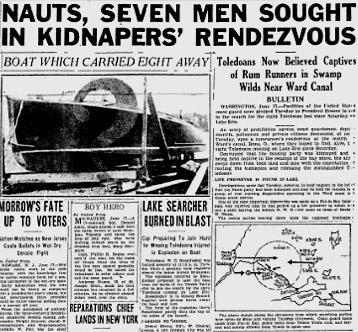On a hot Saturday morning in June, 1930, eight Toledoans set out on a speedboat to attend an Elks picnic on Pelee Island and never made it.
 When the boat was found, empty, about 7:30 p.m. later that Saturday, June 14, it presented several mysteries to the people searching western Lake Erie: the ignition switch was on, the boat was in forward gear, and the throttle was wide open. The two rear gasoline tanks were empty but the front auxiliary tank was full. Glass on both sides of the windshields had been shattered, and the rudder was bent. Plus, there was the bacon.
When the boat was found, empty, about 7:30 p.m. later that Saturday, June 14, it presented several mysteries to the people searching western Lake Erie: the ignition switch was on, the boat was in forward gear, and the throttle was wide open. The two rear gasoline tanks were empty but the front auxiliary tank was full. Glass on both sides of the windshields had been shattered, and the rudder was bent. Plus, there was the bacon.
“A puzzling feature,” the News-Bee reported in its first-day coverage, “is that of six slabs of bacon known to have been carried by the party, only three slabs were found in the boat.”
Aboard were six people described by the News-Bee as “prominent Toledoans.” They were:
- Charles H. Nauts, U.S. collecter of internal revenue for the Toledo district, and active in Toledo politics for 40 years;
- his son, Herbert W. Nauts, an attorney
- Franklin B. Jones, president of the Acme Coal & Builders’ Supply Co., and former Republican member of the board of elections;
- Henry J. Hainbuch, assistant county sanitary engineer and former councilman in the third ward;
- Arthur E. Kruse, president of the Burman-Kruse Mortuary, and
- Frank Miller, heating engineer, former superintentent of the city water works and former councilman.
Also missing were John (Rib) Meyers, the speedboat owner, and John Liptak (also reported as Lipzgach early on), the pilot.
Experienced boaters said they believed the damage indicated the boat had probably struck something at high speed and ejected its passengers.
Every island between Toledo and Pelee Island (part of Ontario, across the international border – hmm, wonder what the Elks had planned?) had been searched over the weekend without a trace – although search parties did turn up the body of a missing Detroit resident, Norman Cuthbert, who apparently died while hunting on Middle Sister Island. One less plausible theory, but the only one that made the party’s survival a possibility, was that the men had been kidnapped and were being held prisoners by “a lake rum hijacking outfit.”
By the time Tuesday’s News-Bee, at right, hit the streets, this less plausible theory had gained quite a bit of credence. Walter Nauts, son of Charles, told the News-Bee he received information secretly that day that his father, brother and other members of the party had been kidnapped. The information came to him from a Cleveland source and he had every reason to believe it reliable.
This revelation unleashed a flurry of activity as “an army of prohibition agents, coast guardsmen, deputy sheriffs, policemen and private citizens decended at noon Tuesday upon a rumrunner’s rendezvous at the mouth of Ward’s Canal, Bono, O., where they hoped to find, alive, the eight Toledoans missing on Lake Erie on Saturday,” according to the News-Bee. The belief was furthered by the discovery by a search ship of a shirt with the initials H.W.N. tied to a life preserver.
The “underground telegraph” of the rum-running world had been buzzing about the story of a kidnapping, based on the belief that the party carried large sums of money and jewelry “of immense value.”
Meanwhile, veteran boatsmen at Put-in Bay maintained the entire group had drowned, probably when the boat hit a fishing net and ejected its occupants.
They were probably right. The following day, after the body of pilot Liptak was found by the Coast Guard, the focus turned to finding the other victims. A week later, the second victim was found when the body of Henry Hainbuch was found four miles south of West Sister Island. That same day, five more bodies were found. The last body, that of Charles Nauts, was found ten days after the accident.
Believe it or not, this was not the first time that city officials had died in a boating accident. In 1911, six city officials and employees – including a councilman and the superintendent of the waterworks – died when their launch collided with the freighter Philip Minch on September 2, 1911. The coverage really is worth a read, especially the maudlin details of the grieving families: ” ‘God be with the widow and the orphans. Help them to bear their burden with Christian fortitude,’ were the prayerful pleadings that came to the ears of a News-Bee reporter as he stepped onto the veranda…”
They don’t write ’em like that anymore.
